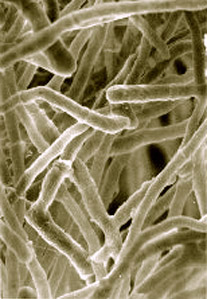Trichoderma reesei
| Trichoderma reesei | |
|---|---|
 |
|
| Scientific classification | |
| Kingdom: | Fungi |
| Division: | Ascomycota |
| Subdivision: | Pezizomycotina |
| Class: | Sordariomycetes |
| Order: | Hypocreales |
| Family: | Hypocreaceae |
| Genus: | Trichoderma |
| Species: | T. reesei |
| Binomial name | |
|
Trichoderma reesei |
|
Trichoderma reesei is a mesophilic and filamentous fungus. It is an anamorph of the fungus Hypocrea jecorina. T. reesei has the capacity to secrete large amounts of cellulolytic enzymes (cellulases and hemicellulases). Microbial cellulases have industrial application in the conversion of cellulose, a major component of plant biomass, into glucose.
T. reesei isolate QM6a was originally isolated from the Solomon Islands during World War II because of its degradation of canvas and garments of the US army. All strains currently used in biotechnology and basic research were derived from this one isolate.
Recent advances in the biochemistry of cellulase enzymology, the mechanism of cellulose hydrolysis (cellulolysis), strain improvement, molecular cloning and process engineering are bringing T. reesei cellulases closer to being a commercially viable route to cellulose hydrolysis. Several industrially useful strains have been developed and characterised, e.g. Rut-C30, RL-P37 and MCG-80. The genome of this organism was released in 2008. This organism also has a mating type dependent characterised sexual cycle.
T. reesei QM6a has a MAT1-2 mating type locus. The opposite mating type MAT1-1, was recently found, thus proving that T. reesei is a heterothallic species. After being regarded as asexual since its discovery more than 50 years ago, sexual reproduction can now be induced in T. reesei QM6a leading to formation of fertilized stromata and mature ascospores.
...
Wikipedia
